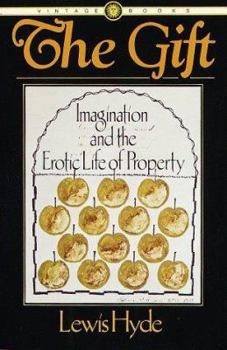The Gift: Imagination and the Erotic Life of Property
Select Format
Select Condition 
Book Overview
"If you want to write, paint, sing, compose, act, or make films, read The Gift." --from the Introduction by Margaret Atwood A modern classic cherished by many of the greatest artists of our time and a... This description may be from another edition of this product.
Format:Paperback
Language:English
ISBN:0394715195
ISBN13:9780394715193
Release Date:February 1983
Publisher:Vintage Books USA
Length:327 Pages
Weight:0.80 lbs.
Dimensions:0.9" x 5.4" x 8.4"
Customer Reviews
5 ratings
This book redefines the "liberal arts"
Published by Thriftbooks.com User , 15 years ago
I enjoy reading books that expand my perspective, but this is one of the rare books that has truly altered it, or at least given me notice that alteration is necessary. What served me best in reading this book was the fact that it was one of only two I brought for a very long trip. This meant that I had plenty of time and less reason to be distracted. With this time I was able to pace myself through a somewhat slow beginning, tolerate the re-telling of some stories with which I was already familiar, and, by the end of Part 1, be willing to write a 4-star review of how amazing it was that Michael Lewis could have so presciently defined the logic and sensibilities of the free software and free culture movements that would blossom within ten years of the book being published. His telling of the real establishment of capitalism--that begin with Martin Luther rather than Adam Smith, and the concomitant destruction of charitable customs in Western nations provide a far more cogent explanation of both the moral bankruptcy and the actual bankruptcy of globalism than I've heard in more than one hundred hours of NPR news stories. And his explanations are spot-on for what I am seeing as a person who is involved with, and invests in, community development and sustainability. Indeed, I think it would make especially good reading in faith communities that also have a social community mission. Then Mr. Hyde lets the other shoe drop: "the gift" describes not only the cultural practices that made economies flourish under conditions beyond the abilities or cares of capitalism, but also the human practices that enable the "genius" of creativity to flourish. The depth of his insights are staggering, and in the end they recontextualized a good portion of my own liberal arts education. I am delighted to have read it, and look forward to applying its lessons to everything I do going forward, starting with buying enough copies to begin giving them away...
Everyone should read this book!
Published by Thriftbooks.com User , 15 years ago
This book is an eye opener. It's not just about how creative endeavors are affected by modern market society, it's about how we got here, and what it means to live in a market-driven world. It does not bash capitalism; but it gives a very accessible overview of how non-market societies used to operate, and suggests that it is still possible to strike a balance between treating art (or anything else) as commodity and as a gift. Highly recommended for anyone, not just artistic types.
As close to the truth as any prose about art can be
Published by Thriftbooks.com User , 16 years ago
This book is the antidote to university education or years in the workforce. It is the same truth that broke my heart rearranged to buck it up again. Mr. Hyde, I only hope someday I can give it back again.
amazing
Published by Thriftbooks.com User , 18 years ago
2 pages into the introduction of this book, I felt I was reading a sacred text. Besides all the economic and philosophical things he deals with, the most valuable thing for me was to understand -why- I feel so rotten doing a piece -for- a market, instead of for the inherent spirit of the artwork. (Some) of the main premises of this book adress the core issue of trying to make art and survive financially in a commodity-driven society. Here are a few of his premises: *that art is a gift - not a commodity, *that we live in a commodity-driven world, *that when we try to force art into being a commodity, we create commodities-- not inspired art, *that when we turn art - or any gift- into a commodity, we harm our family, tribe, and community Really well researched, written, and offers experimental alternatives in the 2006 postscript, for artists wanting to work in their field, instead of at fast food joints or carwashes.
The other half of economics
Published by Thriftbooks.com User , 20 years ago
The first essay in this compilation of three is one of those pieces that can potentially change a person's life. Any student of the social sciences becomes aware that there are many important exchanges made in society which are not and cannot be valued in market transactions. Hyde offers a thoughtful analysis of the social function of goods and services exchanged outside the structure of the market. These arguments are essential as a counterbalance to the positivism expressed in most economic thought today.A good deal of the material from which Hyde draws can be found in Marcel Mauss's book, also called in English, *The Gift* (Essai sur le don). Anybody who has loved Hyde's book will want to read Mauss's as well.






